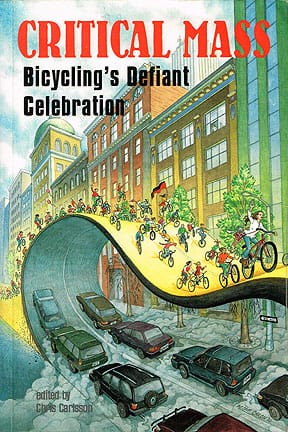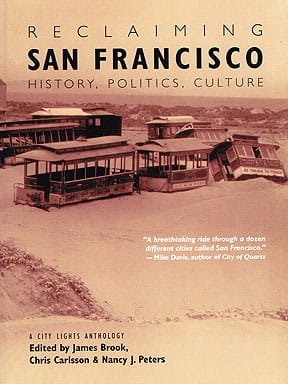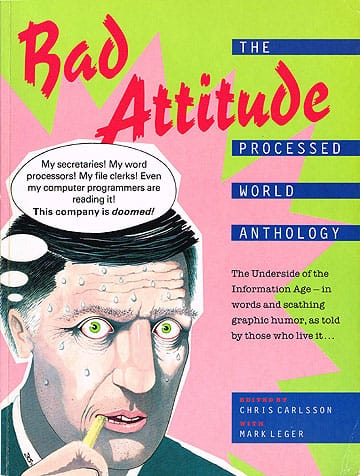
What (or whom) does knowledge serve? a good question on the wall of a closed school in Porto Alegre, Brazil. We might ask the same about work!
I’ve said it before and I’ll say it again: Jobs Don’t Work! The whole structure of modern life has at its center the waged job. It doesn’t really matter if you’re making a paltry minimum wage (or less!) or nearly six figures (or more)—well, it does matter to YOU, since more money is better than less, self-evidently. But the deeper logic of our relationship to how we make life, how we reproduce the material and social conditions of our daily existence, is quite similar regardless of pay scale.
In this era, if you’re not pushing a shopping cart around looking for cans and bottles, or riding in your private jet to the next country club or gallery opening you probably describe yourself as “middle class.” This self-labeling carries social consequences that we don’t think or talk much about. If someone asks you what you do, you’ll probably answer with what your paid job is before quickly changing the subject, since talking about how unsatisfactory your work probably is just makes you look bad. It is socially forbidden to discuss how much money you actually make, even if comparing pay and benefits in a more transparent way would actually be extremely helpful to everyone. Instead, we are expected to glow with pride over how we trade our human capacities for creativity, engagement, sharing, skills, etc., for a vague but always apparently adequate amount of money. Complaints are frowned upon, whether regarding the work itself, the company, or the mysterious level of compensation. It’s ok to bitch about the boss, but all complaining is answered with the same pat solution: get another job! It is simply not allowed into the conversation—or most imaginations—that the “job” is itself the problem. That humans organized into a capitalist economy based on wage-work (whether by the hour or by the annual salary) necessarily leads the vast majority of us into profound loneliness, frustration over our inability to affect the world around us through what we do all day, despair over the emptiness of our daily lives, and a self-reproducing closed circuit of confusion and self-delusion.
I’ve been writing about this (and living it to one extent or another) since the 1970s when I reached adulthood. Perhaps because I grew up going to inner-city elementary schools in Chicago and Oakland where most of my educational experience was one of mind-numbing drudgery and repetition, I learned early to hide my real self behind a dull conformity to expectations. Turns out this was excellent preparation for most of the jobs I got earlier in life. It was the cauldron of experience from which my involvement in starting Processed World magazine emerged (which I co-published 32 times as part of a fluctuating open collective from 1981-1994, with a couple more in 2001 and 2005). We started the magazine in 1981, not long after I stopped working as a temp in San Francisco’s financial district, but most of the other folks on the project worked in the “Abusement Park” for years more. In Processed World, I wrote “Tales of Toil,” fiction, and serious analysis, and after so many years, felt we’d covered it all. But still, few people took up the larger conversation.

We published this in 1993 in Processed World #31, but it was originally an 11×17 poster printed in brown ink on hideous green paper!
We were in touch with radicals elsewhere, on the East Coast (notably our comrades at Midnight Notes, and earlier Root and Branch), in France (Echange & Movement), Italy, Spain, and Germany. Autonomist Marxist ideas were one of the tendencies that influenced us, along with various anarchist traditions, the Situationists, and even council communists from the post-WWI German revolution. Somehow Processed World popped up in unexpected time and place at the dawn of the Information Age not far from Silicon Valley, to describe what it was actually like to work in the developing post-Fordist, precarious economy before most people even knew what was coming. Our theoretical and political foundations helped us to make sense of it, and our commitment to plain language and lived experience helped transmit something of our larger sensibilities beyond our immediate circles.
But we were isolated, and even more so as the Reagan era unfolded and the Old and New Lefts both succumbed to their own historic limits and gradually disintegrated. By the 1990s and the fall of the Soviet Union, the U.S. had already spent more than a decade implementing the neoliberal agenda of rampant financialization and de-industrialization of the economy, shredding social safety nets, and generally trying to re-establish the radical concentration of wealth and power that characterized the early industrial period of the 19th century. Part of that effort was a renewed ideological campaign to make work the center of life, and the avenue by which one could gain access to credit, insurance, and the ever-expanding proliferation of consumer goods. Though real incomes remained stagnant from their early 1970s peak, the perpetual celebration of personal success on the expanding networks of mass entertainment, greatly augmented by the biggest platform of narcissitic self-regard in history, the internet, made dissent and discontent into personal psychological problems best addressed by buying more things, or at worst, getting into therapy!
During this long winter of debt, war, ecological devastation, and kleptocracy, resistance has taken many forms, but has rarely involved work. Maybe the worm is turning now. Recently an unexpected flurry of good writing on work has appeared. A couple of months ago I saw that Jacobin Magazine, a fairly vibrant new publication of the “American left,” self-identified as a socialist publication, published in its issue 13 a piece that briefly enjoyed a viral life. It is called “In the Name of Love” by Miya Tokumitsu, and it goes straight at the ridiculous ideology of tech boosters, nonprofit promoters, and others, that one’s duty in this life is to “do what you love,” and if you do, somehow you’ll make a good amount of money and enjoy creative and social fulfillment too! What a crock!
I’ve always assumed that everyone and anyone can see through that rose-tinted, ideologically driven view of modern work, but truth be told, I hear it all the time. “Do what you love!” is the incantation that gets wistful nods and an automatic gee-whiz thumbs-up among people across wide gaps of income and status. But it’s an ideology that hurts too. Here’s Tokumitsu:
There’s little doubt that “do what you love” (DWYL) is now the unofficial work mantra for our time. The problem is that it leads not to salvation, but to the devaluation of actual work, including the very work it pretends to elevate — and more importantly, the dehumanization of the vast majority of laborers. Superficially, DWYL is an uplifting piece of advice, urging us to ponder what it is we most enjoy doing and then turn that activity into a wage-generating enterprise. But why should our pleasure be for profit? Who is the audience for this dictum? Who is not?
By keeping us focused on ourselves and our individual happiness, DWYL distracts us from the working conditions of others while validating our own choices and relieving us from obligations to all who labor, whether or not they love it. It is the secret handshake of the privileged and a worldview that disguises its elitism as noble self-betterment. According to this way of thinking, labor is not something one does for compensation, but an act of self-love. If profit doesn’t happen to follow, it is because the worker’s passion and determination were insufficient. Its real achievement is making workers believe their labor serves the self and not the marketplace.
…If we believe that working as a Silicon Valley entrepreneur or a museum publicist or a think-tank acolyte is essential to being true to ourselves — in fact, to loving ourselves — what do we believe about the inner lives and hopes of those who clean hotel rooms and stock shelves at big-box stores? The answer is: nothing. Yet arduous, low-wage work is what ever more Americans do and will be doing. According to the US Bureau of Labor Statistics, the two fastest-growing occupations projected until 2020 are “Personal Care Aide” and “Home Care Aide,” with average salaries of $19,640 per year and $20,560 per year in 2010, respectively. Elevating certain types of professions to something worthy of love necessarily denigrates the labor of those who do unglamorous work that keeps society functioning, especially the crucial work of caregivers… Instead of crafting a nation of self-fulfilled, happy workers, our DWYL era has seen the rise of the adjunct professor and the unpaid intern — people persuaded to work for cheap or free, or even for a net loss of wealth.
She goes on to castigate the DWYL ideology as a key element in extracting free labor from primarily women, who do the lion’s share of caregiving, comprise absolute majorities of adjunct professors and unpaid interns, and are on the losing end of the past decades’ efforts to roll back any material benefits gained by feminist agitating. We’ve all lived through the emergence of a culture economy that is based on the assumption that culture producers, whether musicians, writers, or performers, are expected to create and share their work for free. In this bogus “attention economy” your pay is “recognition,” and the hope that if you accumulate enough recognition you may someday be offered actual money to write or sing or perform.
The whole issue of Jacobin is great, reminding me a lot of Processed World. It starts out with an article about C&S Wholesale Grocers, a vast operation in Keene, New Hampshire, written by a former sales rep. We ran dozens of such pieces under the category of “Tales of Toil,” and this is a great contribution to the genre. The central article for which the issue is also named, “Alive in the Sunshine” (by Alyssa Battistoni), makes a pitch for a basic guaranteed annual income as a way to untie the knot that binds work to endless growth, ever-expanding consumption, and ensuing ecological devastation. She offers a useful bit of history to remind us that the treadmill of continual growth was not always the only way to think about economic health:
The mythology surrounding the New Deal often obscures the fact that labor’s response to the Depression was not to make more work, but to share existing work more broadly by shifting to a thirty-hour workweek; Keynes himself famously predicted we’d be down to a fifteen-hour workweek by the end of the century. The decision to use fiscal policy to stimulate consumption instead was a way of avoiding deeper structural changes — to grow the pie rather than ask who was eating most of it. Since then, instead of increasing leisure time, productivity gains have largely increased private consumption for an increasingly small number of people. These days, of course, people are having leisure forced on them — it’s employers who are cutting hours and workers who are desperate for more. It’s clear that we can meet needs with vastly less labor than will support a population dependent on stagnating wages. While neoclassical economists pose the consumption-leisure tradeoff as a choice made by individuals, whether or not people work in the first place is clearly determined by decisions made at a society-wide level.
It’s beginning to look like we should have taken the other New Deal. We need to explicitly shift toward working less — to reorient the consumption-leisure tradeoff towards the latter on a social level — and share the work that remains more evenly… Finding ways to live luxuriously but also lightly, adequately but not ascetically, won’t always be easy. But perhaps in the post-post-scarcity society, somewhere between fears of generalized scarcity and dreams of generalized decadence, we can have the things we never managed to have in the time of supposed abundance: enough for everyone, and time for what we will.
We made similar arguments in dozens of articles in Processed World magazine. I thought about this for so long that I came to feel quite isolated in my interest in the topic, and my way of addressing it. We used to call Processed World “the magazine with a Bad Attitude” (Adam Cornford coined that great tagline), and it turned out to be a lot more cogent than we even thought at the time. Attitude has become more important than skill in the vast majority of jobs. This is partly because so many jobs are so simple that anyone can learn them in an hour or less. But it’s also because one’s attitude is an indicator of how much you’ll be willing to work longer hours than you’re actually paid for, how much you’re willing to dedicate mental and social energies to corporate ends both during work hours and well afterwards, too. The false cheerfulness, the “team enthusiasm,” all that coercive apparatus of social control, was precisely our target and it seems that perhaps it is once again coming under scrutiny, in this issue of Jacobin, but also in Kathi Weeks’ recent book The Problem With Work:
…where attitudes themselves are productive, a strong work ethic guarantees the necessary level of willing commitment and subjective investment. Especially in the context of service work and work with an effective or communications component, the individual’s attitude and emotional state are considered crucial skills, along with empathy and sociability. Indeed, the very distinction between a worker’s skills and attitudes becomes difficult to sustain, since, as Robin Leidner notes, “the willingness and capacity of workers to manipulate and project their attitudes in the organization’s interest are central to their competence on the job”. Thus, Doug Henwood claims, “employer surveys reveal that bosses care less about their employees’ candlepower than they do about ‘character’—by which they mean self-discipline, enthusiasm, and responsibility.” As Arlie Hochschild observes in her groundbreaking study of interactive service sector work, “seeming to ‘love the job’ becomes part of the job; and actually trying to love it, and to enjoy the customers, helps the worker in this effort.” Indeed, now more than ever, “workers are expected to be architects of their own better exploitation.” (Henwood)
Weeks’ approach parallels the articles in Jacobin to some extent. She is coming from an academic sociologist point of view, and leans heavily on the work of Max Weber and C. Wright Mills. But she is also an enthusiast for autonomist Marxism, and does a good job of knitting together these usually discordant approaches to offer a blistering assault on the work ethic. She is particularly enamored of the 1970s feminists around the “Wages for Housework” campaign, and uses that effort to illustrate her support for certain kinds of political demands, regardless of how unrealistic they might sound (the basic annual income being a rising example).
Today when neoliberal and post-neoliberal regimes demand that almost everyone work for wages (never mind that there is not enough work to go around), when postindustrial production employs workers’ minds and hearts as well as their hands, and when post-Taylorist labor processes increasingly require the self-management of subjectivity so that attitudes and affective orientations to work will themselves produce value, the dominant ethical discourse of work may be more indispensable than it has ever been, and the refusal of its prescriptions even more timely. The analysis thus attempts to account not only for the ethic’s longevity and power, but also its points of instability and vulnerability… I am interested in demands that would not only advance concrete reforms of work but would also raise broader questions about the place of work in our lives and spark the imagination of a life no longer so subordinate to it—demands that would serve as vectors rather than terminal points… If why we work, where we work, with whom we work, what we do at work, and how long we work are social arrangements and hence properly political decisions, how might more of this territory be reclaimed as viable terrains of debate and struggle? The problem with work is not just that it monopolizes so much time and energy, but that it also dominates the social and political imaginaries.
The work ethic long precedes the recent expression cited above, “do what you love,” but few people question its centrality. Whether it’s an individual struggling to survive by seeking a job, seeking dignity and self-respect in wage-work, or a condescending insistence by the owners of society that everyone should work, to pull themselves up, to earn their way through the sweat of their brow, and all the panoply of ridiculous slogans promoting the planetary submission to work, we are surrounded by an endless chorus promoting work.
Weeks too offers an good analysis of how the work ethic shifted in the latter part of the 20th century, taking its shape as the ‘do what you love’ refrain of the tech and nonprofit boosters.
After the middle of the twentieth century, another element, present but not as stressed in the industrial discourse, came to the forefront of the new postindustrial work ethic—an element that characterized work as a path to individual self-expression, self-development, and creativity… Indeed, the history of the work ethic in the United States demonstrates the adaptability of this ascetic ideal as it spans time and travels across space. As it turns out, the means to the different ends—that is, the behaviors that the ethic prescribes—remain consistent: the identification with and systematic devotion to waged work, the elevation of work to the center or life, and the affirmation of work as an end in itself… when we have no memory or little imagination of an alternative to a life centered on work, there are few incentives to reflect on why we work as we do and what we might wish to do instead… Rather than enforcing conformity, the Protestant ethic is effective to the extent that it is internalized by the individual. The effect, moreover, is not just to shape the individual’s beliefs and values but to promote the individual’s constitution in relation to and identification with productivist norms. The ethic is advice not just about how to behave but also about who to be…
Who to be, indeed? A mere worker? Surely we have more and better things to do than simply work! I wrote Nowtopia six years ago and just enjoyed a renewed interest from folks in Brazil where it was just released in Portuguese. In the book I identify a new politics of work, one that is based on how so many of us have bifurcated lives. We do something for money. It may or may not be something we love to do, and even if it is, most of what actually do at a job is not the part we “loved” when we started. So the common response these days is a type of exodus, or as I’ve described elsewhere, “assertive desertion” from the rat wheel of endless, apparently pointless work. For a growing minority of people, when we’re not at our jobs making money, we’re actually working quite hard on projects of our own choosing. We are not mere workers in these activities precisely because we are fully in control of our activities—as fully human agents, we can create, shape, and innovate to our heart’s content. In other words, we escape the dichotomy imposed by wage-work when we work for free, when we do what we love because we love it, not because it pays our bills.
Weeks points to an analogous process when she responds to Paul LaFargue’s seminal “The Right to Be Lazy”:
the refusal of work it not in fact a rejection of activity and creativity in general or of production in particular. It is not a renunciation of labor tout court, but rather a refusal of the ideology of work as highest calling and moral duty, a refusal of work as the necessary center of social life and means of access to the rights and claims of citizenship, and a refusal of the necessity of capitalist control of production. It is a refusal, finally, of the asceticism of those—even those on the Left—who privilege work over all other pursuits, including “carefree consumption.” … But the refusal of work, as both activism and analysis, does not simply pose itself against the present organization of work; it should also be understood as a creative practice, one that seeks to reappropriate and reconfigure existing forms of production and reproduction. .. In this sense, refusal, like exodus or exit, is an “engaged withdrawl” (or founding leave-taking)”, a creative practice as opposed to a merely defensive stance. The passage from the negative moment of refusal to its constructive moment of exit and invention marks the shift from a reactive gesture of retreat to an active affirmation of social innovation.
But as I argued throughout Nowtopia, looking at examples as diverse as DIY bike repair shops, community gardens, independent free software projects and more, the market is voracious. Nearly everything we do as an “escape” soon becomes recuperated into the logic of small business, rents, bills to pay, and wages to provide. The longer a project based on free cooperation and remaining outside of money persists in a world of market relations, the more relentless the pressure is to cave in and become a proper nonprofit organization, a small business, or just close shop out of the sheer unsustainability of an island of anti-capitalism in a sea of capitalist social relations.
Weeks addresses her criticism more to the humanizers of work, those who seek to reclaim and reorganize work in the capitalist economy to reclaim from alienation the authentic experience of work:
The affirmation of unalienated labor is not an adequate strategy by which to contest contemporary modes of capitalist control; it is too readily co-opted in a context in which the metaphysics of labor and the moralization of work carry so much cultural authority in so many realms. This is not to suggest that we should abandon the struggles for better work, for liberation from mindless and repetitive tasks, dangerous environments, numbing isolation, and petty hierarchies. It is important to recognize, however, that the language and to a certain degree the practices of work humanization have been co-opted.
Both Weeks and Battistoni embrace the call for a basic annual income for everyone regardless of current status as a step in the direction of breaking the utter hegemony of work over life. I’ve been hearing this siren song for decades, and I would not say ‘no’ to such a development, but I do have trouble wrapping my head around so-called radical reforms like this. The capitalist economy is already suffering from a deep and lasting crisis of profitability (on an aggregate worldwide scale). The impossibility of extracting a huge increase in social wages (even just in one nation-state, which is demonstrably inadequate in a globalized economy) from a system in crisis seems self-evident, and points to the necessity of breaking with that logic altogether. But most people aren’t open to that conversation, hoping that we can somehow take baby steps towards a more human, more sane, less barbaric world. Some proponents of radical reform know perfectly well that their demands cannot be met under a capitalist system, but feel that by advancing them they will help raise consciousness about the plain inadequacies of this organization of life. Again, I’m not against it, I just don’t believe it.
What do I propose instead? A worldwide transformation of daily life based on horizontal, self-managed collectivities in workplaces, neighborhoods, schools, cities, regions, etc. confederated at the base of society into networks of directly democratic communities. Whatever that means! How would “local” decision-making interact with regional, national, continental, and global decision-making? Are there enforcement mechanisms for a global majority over recalcitrant areas that, for example, refuse to stop burning coal or refuse to properly manage their fresh water supplies? How the hell should I know? Revolution is very complicated and no longer can we point to the red flag, or the black one, and have a broad consensus, or even a vaguely shared vision, of what it is we’re shooting for.
But I am sure that we will never get anywhere if we don’t make work a central concern of our thoughts and action. So I’m really delighted to see other publications and books appearing where these ideas are starting to get more attention and traction. After my time in Brazil last week, I think maybe I helped promote the conversation there too, and it seems entirely likely that further breakthroughs will emerge in places we aren’t looking at all. The upheavals that keep erupting around the world are all part of an unfolding global revolution. Its outcome is unknowable. But it’s possible—and certainly desirable—that we’ll find our way to a radically better life than the world we’re in now. A key question will be how to make it with our shared efforts, our collective labor. It’s very promising that we’re talking about it again!












Jacobin Lays an Egg – in response to Ms.Tokumitsu’s essay In the Name of Love.
. . .
Most of this essay execrates those who, obviously successful in their pursuits, adopt this slogan as a “philosophy” of life to exploit, as bosses, interns and to manipulate their employees (or team mates) to become workaholics. A corporate culture that requires extreme self-abuse as a demonstration of one’s love for the job is simply transferring the creditor/debtor power relations of neo-liberalism to a micro level. And as Ms Tokumitsu makes clear, individual effort, riveted into the skulls of youth not much after toilet training, is the driving force behind this sociopathic behavior.
Let’s be clear about this – there is nothing new about wanting to find work one can, if not enjoy, at least take pride in. The auto mechanic doesn’t dream of oil-soaked, injured hands, but of righting a mechanical problem – that brings satisfaction at the end of the day. In other contexts, the same applies for the plumber and the electrician. These examples of skilled jobs, and not the “knowledge” work the author highlights, and seems most comfortable discussing, by definition entail pride in execution. Craftwork for generations stood as an example of the good work people sought, and in those small, self-sufficient communities Thoreau mentions in “Life Without Principle” that work was dominant.
Today salary appears to be the only measure of worth and prestige, contrary to the 19th century when social recognition for work done well counted more than money, but still the desire that drives longing for satisfying work often transcends monetary compensation as the prime goal. The number of small businesses started each year by individuals who take a loss of wages from their previous employment, testifies to this fact.
It is certainly true that many illusions accompany the desire to do work one loves, but to condemn the hope for a better life because it is saddled with fantasy hardly suffices for social analysis.
Individualism skews everything, even the deepest, most heartfelt creative impulses. This should not come as a surprise given the wall-to-wall promotion of self-aggrandizement in our schools, the media and most especially in sports. The hold on our culture by this situation chokes countervailing forces. Those forces of community bonding that existed in the past may not have disappeared with the demise of bowling alleys, but it certainly seems more difficult to situate these days.
On the other hand, it is not insignificant, for example, that the internet provides a forum, however tenuous, for sociality. Whether it is in collaborative gaming, social interest groups or simply responding to “comments,” the hollowness of isolated lives seeks fulfillment.
The internet may be the worst illustration of the effort to overcome an atomized existence. The better case could be made by considering the growing popularity of collective endeavors from urban agriculture to cultural manifestations, like the explosion of book fairs across the land. And the best case that I could make rests on the accelerating interest in cooperatives and commoning. For instance, the bi-coastal hotbeds of worker cooperatives have now been joined by developments in cities that lie between those two regions.
May be the slogan Jobs promoted should be altered as a more seductive appeal: “Do what you love. Love what you do, together.”
from http://righttobelazy.com/blog/
I’ll freely cop to being disappointed with comments sections, leftish discourse, etc. – I’m a dman nihilist, after all. Yet I keep plugging away, occasionally heartened by the emerging triumph of nihilism – after all, it is the only ism that has been proven viable and accurate – anarchism never works, socialism is in profound defeat, capitalism is destruction, communism is state capitalism. You seem to go up the water’s ede of nihilism, but recoil and return to the non-rational comforts of horizontal and democratic confederations. Now that can certainly be a way to live in this world,and most likely necessary, but I don’t know how to square that with the known world, where hierarchy emerges everywhere, in nature, in families, in utopian communities, anywhere social beings try to work together.
If the answers are no to the list of plaintive questions you pose, then that seems to be how we should proceed with our analyses. No, there will be no global enforcement mechanisms, for example. No, if you can’t articulate a program of “what you are shooting for,” then it is not likely to be anything of consequece. No, no, in boring procession.
Nihilism is not doomer nonsense, though, either – humans can step over the bodies of their fellow kin and kith. We are equipped to do well, and to do bad, no matter what our relative circumstances are. The “upheavals around the world” are horrible weather catastrophes coming on furiously, and monster mansions aborning across the fruited plain – all reflective of inequality, social dysfunction, entropy. The rarer, more positive, “hopeful” upheavals? – fun to read about in your always stunning blog posts.